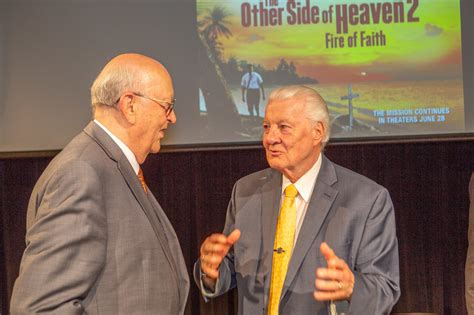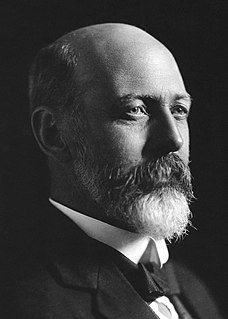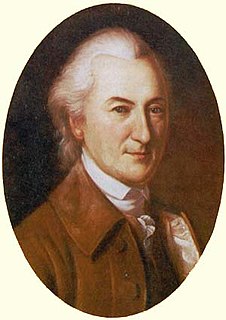Ein Zitat von Daniel Webster
Ein Pflichtgefühl verfolgt uns immer. Es ist allgegenwärtig, wie die Gottheit. Wenn wir uns die Flügel des Morgens nehmen und in den entlegensten Teilen des Meeres verweilen, ist die erfüllte oder verletzte Pflicht immer noch bei uns, sei es für unser Glück oder unser Elend. Wenn wir sagen, dass die Dunkelheit uns bedecken wird, sind unsere Verpflichtungen sowohl in der Dunkelheit als auch im Licht bei uns.
Verwandte Zitate
Gott hat es so angeordnet, dass wir in der Ausübung unserer Pflicht den wahrsten und reichsten Trost für uns selbst finden. Wenn wir uns hinsetzen und über unseren Kummer grübeln, vertieft sich die Dunkelheit um uns herum und schleicht sich in unser Herz, und unsere Stärke verwandelt sich in Schwäche. Aber wenn wir uns von der Dunkelheit abwenden und die Aufgaben und Pflichten übernehmen, zu denen Gott uns ruft, wird das Licht wiederkommen und wir werden stärker werden.
Lasst uns weder durch falsche Anschuldigungen gegen uns von unserer Pflicht abgehalten werden, noch durch die Drohung der Zerstörung oder der Kerker für uns selbst davon abgehalten werden. Lasst uns daran glauben, dass Recht Macht schafft, und in diesem Glauben wollen wir es bis zum Ende wagen, unsere Pflicht so zu erfüllen, wie wir sie verstehen.
Hoffnungslosigkeit ist vielleicht das traurigste Wort in unserer Sprache. Verzweiflung ist der Feind unserer Seelen. Es kann uns lähmen, unseren Fortschritt aufhalten und dazu führen, dass wir den Weg verlieren. Aber die Hoffnung weckt uns wie ein Licht, das in der Dunkelheit scheint. Wir können alles ertragen, wenn unsere Hoffnung auf jemanden gerichtet ist, der uns niemals im Stich lässt – unseren Erlöser, Jesus Christus, der das Licht der Welt ist.
Auch wenn uns befohlen wird, uns zu „waschen“, „uns von Sünden zu reinigen“ und „uns von all unseren Sünden zu reinigen“, bedeutet die Vorstellung, dass wir diese Dinge aus eigener Kraft tun können, das Kreuz und die Gnade Gottes mit Füßen zu treten Jesus Christus. Was auch immer Gott durch seine Gnade in uns wirkt, er befiehlt uns, es als unsere Pflicht zu tun. Gott wirkt alles in uns und durch uns.
Kant glaubt nicht, dass etwas Falsches daran ist, aus Mitgefühl Nutzen zu ziehen. Er glaubt, dass wir die Pflicht haben, Mitgefühl zu entwickeln, indem wir an den Situationen anderer teilhaben und uns ein Verständnis für sie aneignen. Er glaubt, dass wir auch die Pflicht haben, uns zu einer Person zu machen, für die die Erkenntnis, dass etwas unsere Pflicht ist, ein ausreichender Anreiz wäre, es zu tun (wenn uns keine anderen Anreize zur Verfügung stünden). Das meint er mit „der Pflicht, aus dem Motiv der Pflicht heraus zu handeln“.
Indem wir die Pflicht, die uns am nächsten liegt, die Pflicht, die jetzt in unseren Händen liegt, gut erfüllen, machen wir uns stärker; Wenn wir auf diese Weise Schritt für Schritt unsere Kräfte verbessern, können wir einen Zustand erreichen, in dem es unser Privileg sein wird, die begehrtesten und ehrenvollsten Pflichten im Leben und in der Gesellschaft zu erfüllen.
Satan möchte unsere Seelen und die unserer Kinder beanspruchen. Er möchte, dass unsere Ehen und unsere Familien scheitern. Er möchte, dass die Dunkelheit herrscht. Trotzdem müssen wir uns keine Sorgen machen oder von unserer Pflicht gegenüber unserer Familie (gegenwärtig oder zukünftig), unserer Gemeinschaft oder anderen zurückweichen, denn Gott wird uns immer in unseren ehrlichen Bemühungen, seinen Willen zu erfüllen, unterstützen und segnen. Er möchte, dass wir Erfolg haben, mehr als Satan möchte, dass wir scheitern – und Gott ist immer mächtiger.
Immer „Pflicht“. Ich habe das Wort satt. Es sind viele alte Dummköpfe in Flanellwesten und alte Frauen mit Fußwärmern und Rosenkränzen, die uns ständig „Pflicht, Pflicht!“ ins Ohr dröhnen. Ah! von Jove! Die Pflicht eines Menschen besteht darin, das Große zu empfinden, das Schöne zu schätzen und nicht alle Konventionen der Gesellschaft mit der Schande zu akzeptieren, die sie uns auferlegt.
Ehre, Gerechtigkeit und Menschlichkeit fordern uns auf, die Freiheit, die wir von unseren Vorfahren erhalten haben, zu bewahren und an unsere Nachkommen weiterzugeben. Es ist nicht unsere Pflicht, unseren Kindern Reichtum zu hinterlassen, aber es ist unsere Pflicht, ihnen die Freiheit zu hinterlassen.
Was uns Prüfungen bereitet, wird uns Triumph bescheren; und was uns das Herz schmerzt, wird uns mit Freude erfüllen. Das einzig wahre Glück besteht darin, zu lernen, voranzukommen und sich zu verbessern. Dies könnte nicht geschehen, wenn wir nicht mit Fehlern, Unwissenheit und Unvollkommenheit begonnen hätten. Wir müssen durch die Dunkelheit gehen, um das Licht zu erreichen.










































